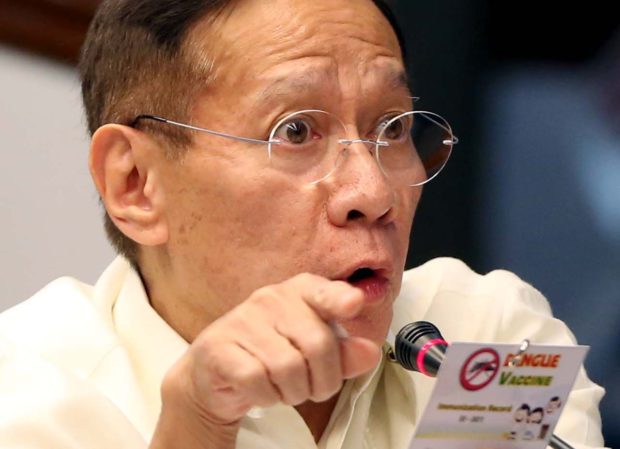DOH gets P1.16-B refund from Dengvaxia maker

Health Sec. Francisco Duque III INQUIRER FILE PHOTO / LYN RILLON
CITY OF SAN FERNANDO—French pharmaceutical firm Sanofi Pasteur has reimbursed the Department of Health (DOH) P1.16 billion for stocks
of unused dengue vaccine, Dengvaxia, Health Secretary Francisco Duque III said here on Friday.
The DOH is also heeding the advice of a National Expert Panel to suspend the mass immunization program pending unresolved safety issues, he said.
Duque bared Sanofi’s payment when he addressed some 2,000 barangay health workers and village leaders during a dengue summit at Bren Z. Guiao Convention Center here.
Sanofi’s refund came in the form of a check on Thursday, Undersecretary Eric Domingo said later in a news briefing.
Article continues after this advertisementThe Dengvaxia stocks have been withdrawn from DOH warehouses, except in Cebu and parts of Batangas province.
Article continues after this advertisementIn a Jan. 18 summary of discussions that Domingo presented to the media, one of the expert panel’s recommendations was the continued suspension of the P3.5-billion Dengvaxia mass immunization program, which Duque stopped in November 2017.
“In view of the sparse information from the clinical trials on the consequences of administration of less than three doses of Dengvaxia, a firm recommendation to complete the schedule of vaccination cannot be given,” the expert panel said.
On Friday, the DOH launched in Pampanga its “Dengue Immunization Identification Cards” for children who received Dengvaxia shots. At least 150 children and 150 mothers at San Isidro Integrated School in San Fernando received the cards.
The cards will help the holders access medical aid in public and private hospitals, according to Leonita Gorgolon, DOH regional director.
Meanwhile, the city government of Tanauan in Batangas province has stepped up measures to monitor the condition of 2,386 children in the city who were inoculated with the dengue vaccine after two kids, ages 9 to 12, were hospitalized this month.
Dr. Adel Bautista, the city health officer, said both kids, who received the full dose of Dengvaxia in 2016, tested positive for “severe dengue.”
Twelve other children developed skin rashes and fever in January, although they later tested negative for dengue.